Operation Market Garden order of battle
This is the complete order of battle of Allied and German forces involved during Operation Market Garden.
Allied forces
US General Dwight D. Eisenhower was Supreme Commander of the Supreme Headquarters Allied Expeditionary Forces (SHAEF) and in that capacity was ultimately responsible for the planning and execution of the whole operation. British Air Chief Marshal Sir Arthur Tedder was his deputy, while Major General Walter Bedell Smith was chief of staff.
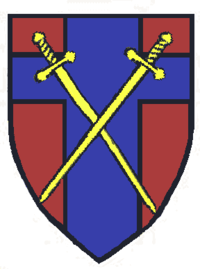 21st Army Group
21st Army Group
Under Field Marshal Sir Bernard L. Montgomery
 First Allied Airborne Army
First Allied Airborne Army
Commanded by Lieutenant General Lewis H. Brereton, USAAF
British I Airborne Corps
Lieutenant-General Frederick Browning; also deputy commander of the 1st Airborne Army
 1st Airborne Division - Major-General Roy Urquhart
1st Airborne Division - Major-General Roy Urquhart
- 1st Parachute Brigade - Brigadier Gerald Lathbury
- 1st Parachute Battalion - Lieutenant-Colonel David Dobie
- 2nd Parachute Battalion - Lieutenant-Colonel John Frost
- 3rd Parachute Battalion - Lieutenant-Colonel John A.C. Fitch
- 1st Airlanding Anti-Tank Battery, Royal Artillery - Major William F. Arnold
- 1st Parachute Field Squadron, Royal Engineers - Major Douglas C. Murray
- 16th (Parachute) Field Ambulance, Royal Army Medical Corps - Lieutenant-Colonel E. Townsend
- 4th Parachute Brigade - Brigadier John W. Hackett
- 10th Parachute Battalion - Lieutenant-Colonel Kenneth B.I. Smyth
- 11th Parachute Battalion - Lieutenant-Colonel George H. Lea
- 156th Parachute Battalion - Lieutenant-Colonel Sir Richard de Bacquencourt Des Voeux
- 2nd Airlanding Anti-Tank Battery, Royal Artillery - Major A.F. Haynes
- 4th Parachute Field Squadron, Royal Engineers - Major Aeneas Perkins
- 133rd (Parachute) Field Ambulance, Royal Army Medical Corps - Lieutenant-Colonel W.C. Alford
- 1st Airlanding Brigade - Brigadier Philip Hicks
- 1st Battalion Border Regiment - Lieutenant-Colonel Thomas Haddon
- 2nd Battalion South Staffordshire Regiment - Lieutenant-Colonel W. Derek H. McCardie
- 7th Battalion King's Own Scottish Borderers - Lieutenant-Colonel Robert Payton-Reid
- 9th Airborne Field Company, Royal Engineers - Major John C. Winchester
- 181st (Airlanding) Field Ambulance, Royal Army Medical Corps - Lieutenant-Colonel Arthur T. Marrable
- 21st Independent Parachute Company (pathfinders) - Major Bernard Wilson
- 1st Airlanding Light Regiment, Royal Artillery - Lieutenant-Colonel William F.K. Thompson
- 1st Forward (Airborne) Observation Unit, Royal Artillery - Major Denys R. Wight-Boycott
- 1st Airborne Divisional Signals - Lieutenant-Colonel Tom Stephenson
- 1st Airborne Reconnaissance Squadron - Major Charles Frederick H. Gough
- 261st (Airborne) Field Park Company, Royal Engineers - detachments, Lieutenant William H. Skinner
- 250th (Airborne) Light Composite Company, Royal Army Service Corps
- 1st (Airborne) Divisional Field Park, Royal Army Ordnance Corps - Major Cecil Cyril Chidgey
- 1st (Airborne) Divisional Workshops, Royal Electrical and Mechanical Engineers
- 1st (Airborne) Divisional Provost Company, Corps of Military Police - Captain William B. Gray
- 89th (Parachute) Field Security Section, Intelligence Corps - Captain John E. Killick
- Glider Pilot Regiment - Lieutenant-Colonel George Chatterton (flew to Nijmegen)
- No.1 Wing - Lieutenant-Colonel Iain Murray
- No.2 Wing - Lieutenant-Colonel John Place
- 1st Parachute Brigade - Brigadier Gerald Lathbury
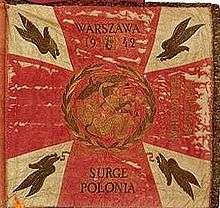 Polish 1st Independent Parachute Brigade - Brigadier-General Stanisław Sosabowski
Polish 1st Independent Parachute Brigade - Brigadier-General Stanisław Sosabowski
- 1st Parachute Infantry Battalion - Lieutenant-Colonel M. Tonn
- 2nd Parachute Infantry Battalion - Lieutenant-Colonel W. Ploszewski
- 3rd Parachute Infantry Battalion - Major W. Sobocinski

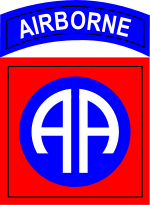 82nd Airborne Division - Brigadier General James M. Gavin
82nd Airborne Division - Brigadier General James M. Gavin
- 504th Parachute Infantry Regiment - Colonel Reuben H. Tucker
- 505th Parachute Infantry Regiment - Colonel William E. Eckman
- 508th Parachute Infantry Regiment - Colonel Roy E. Lindquist
- 325th Glider Infantry Regiment
- 376th Parachute Field Artillery Battalion
- 319th Glider Field Artillery Battalion
- 320th Glider Field Artillery Battalion
- 456th Parachute Field Artillery Battalion
- 80th Airborne Antiaircraft Battalion
- 82nd Airborne Signal Company
- 307th Airborne Engineer Battalion
- 307th Airborne Medical Company
- 82nd Counter Intelligence Corps Detachment
- 782nd Airborne Ordnance Maintenance Company
- 407th Airborne Quartermaster Company
- 82nd Parachute Maintenance Company
 101st Airborne Division - Major General Maxwell D. Taylor
101st Airborne Division - Major General Maxwell D. Taylor
- 501st Parachute Infantry Regiment - Colonel Howard R. Johnson
- 502nd Parachute Infantry Regiment - Lieutenant-Colonel John H. Michaelis
- 506th Parachute Infantry Regiment - Colonel Robert F. Sink
- 327th Glider Infantry Regiment
- 1st Battalion, 401st Glider Infantry Regiment
- 321st Glider Field Artillery Battalion
- 377th Parachute Field Artillery Battalion
- 463rd Parachute Field Artillery Battalion
- 907th Glider Field Artillery Battalion
- 81st Airborne Antiaircraft Battalion
- 101st Airborne Signal Company
- 326th Airborne Engineer Battalion
- 326th Airborne Medical Company
- 101st Counter Intelligence Corps Detachment
- 801st Airborne Ordnance Maintenance Company
- 426th Airborne Quartermaster Company
- 101st Parachute Maintenance Company
 IX Troop Carrier Command - Major General Paul L. Williams
IX Troop Carrier Command - Major General Paul L. Williams
- 50th Troop Carrier Wing (C-47 Skytrain) - Brigadier General Julian M. Chappell
- 52nd Troop Carrier Wing (C-47) - Brigadier General Harold L. Clark
- 53rd Troop Carrier Wing (C-47) - Brigadier General Maurice M. Beach
- No. 38 Group RAF - Air Marshal L.M. Hollinghurst (under operational control of IX Troop Carrier Command)
- No. 190 Squadron RAF (Stirlings)
- No. 196 Squadron RAF (Stirlings)
- No. 295 Squadron RAF (Stirlings)
- No. 299 Squadron RAF (Stirlings)
- No. 570 Squadron RAF (Stirlings)
- No. 620 Squadron RAF (Stirlings)
- No. 644 Squadron RAF (Stirlings)
- No. 296 Squadron RAF (Armstrong Whitworth Albemarle)
- No. 297 Squadron RAF (Albemarle)
- No. 198 Squadron RAF (Handley Page Halifax)
- No. 644 Squadron RAF (Halifax)
- No. 46 Group RAF - Air Commodore L. Darvall (under operational control of IX Troop Carrier Command) (Douglas Dakota)
British Second Army
Commanded by Lieutenant-General Miles Dempsey
VIII Corps
Lieutenant-General Richard O'Connor
_Insignia.svg.png) 11th Armoured Division - Major-General G. P. B. Roberts
11th Armoured Division - Major-General G. P. B. Roberts 3rd Infantry Division - Major-General L. G. Whistler
3rd Infantry Division - Major-General L. G. Whistler.jpg) 49th (West Riding) Infantry Division
49th (West Riding) Infantry Division 4th Armoured Brigade - Brigadier R. M. P. Carver
4th Armoured Brigade - Brigadier R. M. P. Carver 1st Belgian Infantry Brigade - Colonel B. Piron
1st Belgian Infantry Brigade - Colonel B. Piron
XII Corps
Lieutenant-General Neil Ritchie
 7th Armoured Division - Major-General G. L. Verney
7th Armoured Division - Major-General G. L. Verney_Division_Insignia.png) 15th (Scottish) Infantry Division - Major-General C. M. Barber
15th (Scottish) Infantry Division - Major-General C. M. Barber 53rd (Welsh) Infantry Division - Major-General R. K. Ross
53rd (Welsh) Infantry Division - Major-General R. K. Ross

 XXX Corps
XXX Corps
Lieutenant-General Brian Horrocks
- 2nd Household Cavalry Regiment
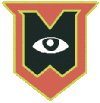 Guards Armoured Division - Major-General A. H. S. Adair
Guards Armoured Division - Major-General A. H. S. Adair
- 5th Guards Armoured Brigade
- 2nd Armoured Battalion, Grenadier Guards
- 1st Armoured Battalion, Coldstream Guards
- 2nd Armoured Battalion, Irish Guards
- 1st Motorised Battalion, Grenadier Guards[1]
- 32nd Guards Brigade
- 5th Battalion, Coldstream Guards
- 1st Battalion, Welsh Guards
- 3rd Battalion, Irish Guards
- 2nd Armoured Reconnaissance Battalion, Welsh Guards[2]
- 1st Independent Machine Gun Company (Royal Northumberland Fusiliers)
- 55th (Wessex) Field Regiment, Royal Artillery[3]
- 153rd (Leicestershire Yeomanry) Field Regiment, Royal Artillery[4]
- 21st Anti-Tank Regiment, Royal Artillery[5]
- 94th Light Anti-Aircraft, Regiment Royal Artillery
- 14th Field Squadron, Royal Engineers
- 615th Field Squadron, Royal Engineers
- 148th Field Park Squadron, Royal Engineers
- 11th Bridging Troop, Royal Engineers
- Guards Armoured Division Postal Unit, Royal Engineers
- 310th Armoured Brigade Company, Royal Army Service Corps
- 224th Infantry Brigade Company, Royal Army Service Corps
- 535th Infantry Brigade Company, Royal Army Service Corps
- 5th Guards Armoured Brigade Workshop, Royal Electrical and Mechanical Engineers
- 32nd Guards Brigade Workshop, Royal Electrical and Mechanical Engineers
- 19th Field Ambulance, Royal Army Medical Corps
- 128th Field Ambulance, Royal Army Medical Corps
- 8th Guards Field Dressing Station, Royal Army Medical Corps
- 60th Field Hygiene Section, Royal Army Medical Corps
- 5th Guards Armoured Brigade
 43rd (Wessex) Infantry Division - Major-General Ivor Thomas
43rd (Wessex) Infantry Division - Major-General Ivor Thomas
- 129th Infantry Brigade
- 4th Battalion, Somerset Light Infantry
- 4th Battalion, Wiltshire Regiment
- 5th Battalion, Wiltshire Regiment
- 130th Infantry Brigade
- 4th Battalion, Dorsetshire Regiment
- 5th Battalion, Dorsetshire Regiment
- 7th Battalion, Hampshire Regiment
- 214th Infantry Brigade
- 1st Battalion, Worcestershire Regiment
- 5th Battalion, Duke of Cornwall's Light Infantry
- 7th Battalion, Somerset Light Infantry
- 43rd Reconnaissance Regiment, Reconnaissance Corps
- 8th Battalion, Middlesex Regiment (Machine Guns)
- 94th (Queen's Own Dorset Yeomanry) Field Regiment, Royal Artillery
- 112th (Wessex) Field Regiment, Royal Artillery
- 179th Field Regiment, Royal Artillery
- 59th Anti-Tank Regiment, Royal Artillery
- 110th Light Anti-Aircraft Regiment, Royal Artillery
- 204th Field Company, Royal Engineers
- 260th Field Company, Royal Engineers
- 553rd Field Company, Royal Engineers
- 207th Field Park Company, Royal Engineers
- 13th Bridging Platoon, Royal Engineers
- 16th Airfield Construction Group, Royal Engineers
- 43rd (Wessex) Division Postal Unit, Royal Engineers
- 54th Company, Royal Army Service Corps
- 504th Company, Royal Army Service Corps
- 505th Company, Royal Army Service Corps
- 506th Divisional Company, Royal Army Service Corps
- 129th Infantry Brigade
 50th (Northumbrian) Infantry Division - Major-General D. A. H. Graham; On September 18, the division was transferred to VIII Corps
50th (Northumbrian) Infantry Division - Major-General D. A. H. Graham; On September 18, the division was transferred to VIII Corps
- 69th Infantry Brigade
- 5th Battalion, East Yorkshire Regiment
- 6th Battalion, Green Howards
- 7th Battalion, Green Howards
- 151st Infantry Brigade
- 6th Battalion, Durham Light Infantry
- 8th Battalion, Durham Light Infantry
- 9th Battalion, Durham Light Infantry
- 231st Infantry Brigade
- 1st Battalion, Dorsetshire Regiment
- 1st Battalion, Hampshire Regiment
- 7th Battalion, Devonshire Regiment
- 2nd Battalion, Cheshire Regiment (Machine Gun)
- 74th Field Regiment, Royal Artillery
- 90th (City of London) Field Regiment, Royal Artillery
- 124th Field Regiment, Royal Artillery
- 102nd (Northumberland Hussars) Anti-Tank Regiment, Royal Artillery
- 25th Light Anti-Aircraft Regiment, Royal Artillery
- 233rd Field Company, Royal Engineers
- 501st Field Company, Royal Engineers
- 505th Field Company, Royal Engineers
- 235th Field Park Company, Royal Engineers
- 50th (Northumbrian) Division Postal Unit, Royal Engineers
- 69th Infantry Brigade
 8th Armoured Brigade - Brigadier E. G. Prior-Palmer
8th Armoured Brigade - Brigadier E. G. Prior-Palmer
 Royal Netherlands Brigade 'Prinses Irene' - Colonel A. de Ruyter van Steveninck
Royal Netherlands Brigade 'Prinses Irene' - Colonel A. de Ruyter van Steveninck
Air forces
Royal Air Force
![]() Second Tactical Air Force - Air Marshal Sir Arthur Coningham
Second Tactical Air Force - Air Marshal Sir Arthur Coningham
- No. 83 Group RAF - Air Vice-Marshal H. Broadhurst
- No. 2 Group RAF - Air Vice-Marshal B. E. Embry
- 136, 138, 140 Wings (Mosquito)
- 137, 139 Wings (B-25 Mitchell)
- No. 84 Group RAF - Air Vice Marshal Leslie Brown
Fighter Command - Air Marshal Roderick Hill
Bomber Command - Air Chief Marshal Sir Arthur Harris
RAF Coastal Command - Air Chief Marshal Sholto Douglas
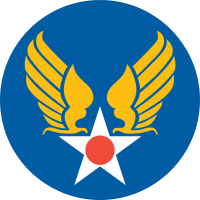 United States Army Air Forces
United States Army Air Forces
![]() U.S. Eighth Air Force - Lieutenant General James H. Doolittle
U.S. Eighth Air Force - Lieutenant General James H. Doolittle
![]() U.S. Ninth Air Force - Lieutenant General Hoyt S. Vandenberg
U.S. Ninth Air Force - Lieutenant General Hoyt S. Vandenberg
German forces
The majority of German units stationed west of the Rhine were under the responsibility of Oberbefehlshaber West (OB West), commanded at the time by Generalfeldmarschall Gerd von Rundstedt.
Due to a lack of replacements (both in terms of personnel and materiel) German units were generally severely understrength at this point in the war, with many units at about 50% of establishment strength.
German Armed Forces Group (AFC) Netherlands
Commanded by General der Flieger Friedrich Christiansen
Army Group B
Commanded by Generalfeldmarschall Walther Model
II SS Panzer Corps
SS-Obergruppenführer Wilhelm Bittrich
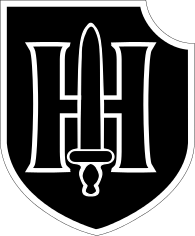 9th SS Panzer Division Hohenstaufen - SS-Obersturmbannführer Walter Harzer
9th SS Panzer Division Hohenstaufen - SS-Obersturmbannführer Walter Harzer
- 9th SS Panzer Regiment
- 19th and 20th SS Panzergrenadier Regiments
- 9th SS Artillery Regiment
- 9th SS Recon Battalion
- 9th SS Antitank Battalion
- 9th SS Engineer Battalion
- 9th SS Flak Battalion
- 9th SS Signals Battalion
 10th SS Panzer Division Frundsberg - SS-Brigadeführer Heinz Harmel
10th SS Panzer Division Frundsberg - SS-Brigadeführer Heinz Harmel
- 10th SS Panzer Regiment
- 21st and 22nd SS Panzergrenadier Regiments
- 10th SS Artillery Regiment
- 10th SS Recon Battalion
- 10th SS Antitank Battalion
- 10th SS Engineer Battalion
- 10th SS Flak Battalion
- 10th SS Signals Battalion
- Training Regiment of Fallschirm-Panzer Division 1 Hermann Göring- Oberstleutnant Fritz Fullriede
- Kampfgruppe "Von Tettau" - Generalleutnant Hans von Tettau
- Kampfgruppe "Kraft"-SS-Sturmbannführer Sepp Kraft of Training and Replacement Battalion 16 {of the 16th SS Panzergrenadier Division Reichsführer-SS}
- Kampfgruppe "Henke" - A Fallschirmjager training Regiment under the command of Oberst Henke
Fifteenth Army
General der Infanterie Gustav-Adolf von Zangen
LXVIII Corps
General der Infanterie Otto Sponheimer
- 346th Infantry Division - Generalleutnant Erich Diestel
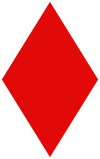 711th Static Division - Generalleutnant Josef Reichert
711th Static Division - Generalleutnant Josef Reichert 719th Coastal Division - Generalleutnant Karl Sievers - Transferred to 1st Fallschirmarmee September 4.
719th Coastal Division - Generalleutnant Karl Sievers - Transferred to 1st Fallschirmarmee September 4.
LXXXVIII Corps
General der Infanterie Hans-Wolfgang Reinhard
- Kampfgruppe "Chill" - Generalleutnant Kurt Chill
 59th Infantry Division - Generalleutnant Walter Poppe
59th Infantry Division - Generalleutnant Walter Poppe- 245th Infantry Division - Oberst Gerhard Kegler
 712th Static Division - Generalleutnant Friedrich-Wilhelm Neumann
712th Static Division - Generalleutnant Friedrich-Wilhelm Neumann
LXXXVI Corps
General der Infanterie Hans von Obstfelder
- 176th Infantry Division - Oberst Christian Landau - Transferred to 1st Fallschirmarmee September 4.
- Kampfgruppe "Walther"
- 6th Parachute Regiment - Oberstleutnant Friedrich August Freiherr von der Heydte - Transferred to 1st Fallschirmarmee September 4.
- 107th Panzer Brigade - Major Freiherr von Maltzahn
- Division "Erdmann" - Generalleutnant Wolfgang Erdmann - Transferred to 1st Fallschirmarmee September 4.
XII SS Corps
SS-Obergruppenführer Kurt von Gottberg
- 180th Infantry Division - Generalmajor Bernhard Klosterkemper
- 190th Infantry Division - Generalleutnant Ernst Hammer
- 363rd Volkgrenadier Division - Generalleutnant Augustus Dettling
Wehrkreis VI
Corps "Feldt" - General der Kavalerie Kurt Feldt
- 406th Landesschützen Division - Generalleutnant Scherbenning
Luftwaffe West
Colonel General Kurt Student
- 1st Parachute Army - Drawn from a pool of available units, almost all understrength; totaling 3,000 men as of September 1944
- I Parachute Corps
- II Parachute Corps - General der Fallschirmtruppen Eugen Meindl
- 86th Corps
See also
References and notes
- ↑ three companies of infantry mounted on ,-3 half-tracks except for the scout platoon which used 13 Universal carriers
- ↑ three Cromwell tanks and one Challenger tank per troop
- ↑ 24 towed 25-pdr Gun-howitzers
- ↑ 24 Priest and/or Sexton self-propelled guns
- ↑ two batteries of 17-pdr guns and two batteries of M10 tank destroyers
External links
- Stephen Badsey, Arnhem 1944: Operation 'Market Garden. Osprey Publishing, Ltd. 1998. ISBN 1-85532-302-8
- Cornelius Ryan, A Bridge Too Far. Simon and Schuster, 1974. ISBN 0-684-80330-5
External links
- Royal Engineers Museum The Royal Engineers and Operation Market Garden